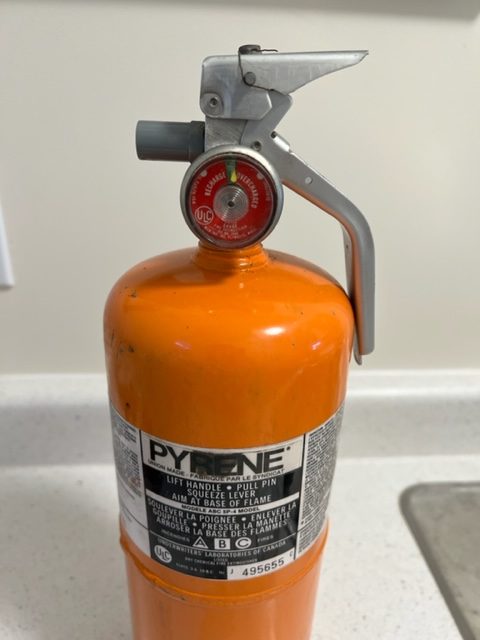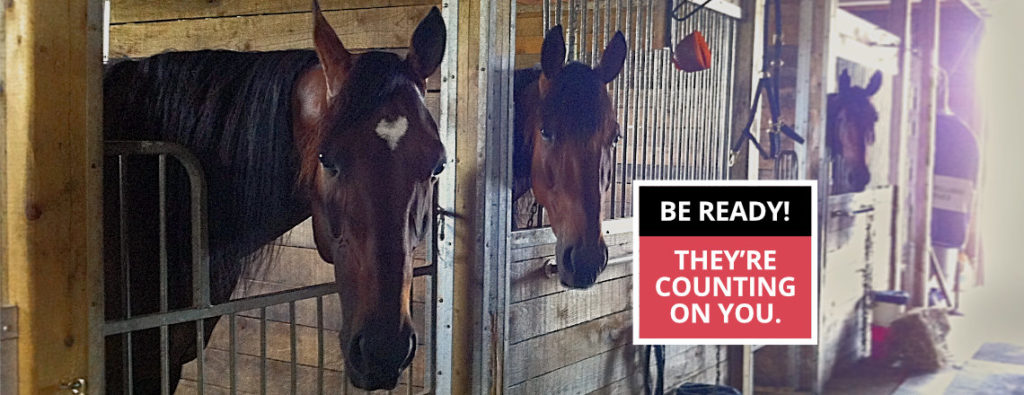November Fire Prevention Education Month at Equine Guelph
New Barn Fire Prevention Resource – Inspecting Extinguishers

When is the last time you checked your fire extinguisher? Find out important maintenance information in a new video posted on TheHorsePortal.ca/FirePreventionTool. Learn about this and more barn fire safety practices throughout November as part of Equine Guelph’s Fire Prevention Education Month.
The new feature video in the free Fire Prevention tool explains how to inspect and maintain portable fire extinguishers and when to replace them. Do you know how often they should be checked?
- A – Annually
- B – Monthly
- C – Four times a year
Find out from firefighter, Robert Nagle, in the video posted on TheHorsePortal.ca/FirePreventionTool
Check out the top three causes of barn fire, then download handy barn information sheets like the top 10 checklist for barn fire safety at TheHorsePortal.ca/FirePreventionTool.
Ever have a fire prevention officer look at your farm set up? They will see it differently, with their educated lens for finding combustible materials and ignition sources.
Sign up for Equine Guelph’s upcoming short online course, Fire and Emergency Preparedness, running November 13 – 20, 2023 and you too can find out what to look for in order to decrease risks.
Emergency preparedness will also be a focus, including identifying potential emergency threats in your region and developing a disaster plan. For example: Who would you call if a wildfire was approaching your property? Do you have an evacuation plan with contacts nearby and further away should the emergency dictate that need? Waiting until disaster is at your door does not bode well. For high-pressure situations, you already want a plan in place.
“Forward planning for emergencies, including site preparation and maintenance, is the best way to prevent major situations and to ensure rapid response by emergency personnel,” says Ryan Dick, Health & Safety Consultant with Workplace Safety & Prevention Services. “Plan a fire route and keep the area immediately surrounding buildings free of obstructions like tractors, implements, wagons and equipment so emergency vehicles can position themselves in the right spot from the outset. And make sure you communicate the fire plan and route to all workers.”
“It’s important to keep the farm lane open and in good condition, with a solid base foundation that will carry fully loaded fire equipment,” he adds. “Ensuring your civic address sign is in good condition and easily visible from the road can make the difference between damage and destruction.”
Past students agree and attest to the importance of learning emergency preparedness.
“This course was eye-opening and very informative. I learned about the realities of barn fire detection and response, and the importance of doing due diligence in planning and prevention. The best way to deal with a barn fire is to prevent it from occurring in the first place, and this course provides a wealth of information that will help you to accomplish the goal of a fire-safe facility. Every horse owner can do something to make their horse’s space safer. Every horse owner/enthusiast can benefit from the information in this course.”
Cathy Vogelweid, DVM (Columbia, Missouri, USA)
Student – Fire & Emergency Preparedness
“Equine Guelph’s Fire & Emergency Preparedness course was even more helpful and interesting than I thought it would be! In a week, I learned so much from experts in and out of the horse community, and would definitely recommend it to anybody who owns or cares for horses.”
Kathryn G. – Horse Owner and Groom (Chris Delia Stables, Mohawk Racetrack)
Student – Fire & Emergency Preparedness
“My participation in the Fire & Emergency Preparedness course helped me see my facility in a new light. Our assignment was to evaluate our barn. I realized that every night I closed my barn I literally was locking my horses in with only one way out. I retrofitted all doors so that latches could be released from both inside and outside of my barn. As a result of my participation, I have also opened a dialogue for the equine community with the local fire department. Game changer!”
Nancy Chamberlain, Owner (Peculiar, MO, USA)
Student – Fire & Emergency Preparedness

Course instructor, Dr. Susan Raymond will share practical ways horse owners can lower risks in their barns while guiding the class to develop their individual disaster plans. “We expect the discussion boards to be very lively with both Rebecca Husted and Mike King joining us,” says Dr. Raymond.Dr. Rebecca Gimenez-Husted will return as co-instructor to shed light on burning questions. Husted is an international expert in the areas of Technical Large Animal Emergency Rescue, fire prevention and emergency preparedness. A past logistics officer for the Federal Emergency Management Agency’s (agency of the United States Department of Homeland Security) Veterinary Medical Assistance Team (VMAT -2), decorated combat veteran and a major in the United States Army Reserves, she is active in various organizations related to disaster preparedness.Equine industry leader, Mike King from Acera Insurance will be a guest expert to help students talk about insurance issues for business sustainability. He will be fielding questions regarding insurance issues that many are currently facing and discussing potentially unforeseen challenges that may crop up in the future.
Make prevention a priority and register today for the one-week online course, Fire and Emergency Preparedness, scheduled to begin November 13, 2023.
Take the first step today by investing five minutes to complete the FREE questionnaire at TheHorsePortal.ca/FirePreventionTool to find out if your barn passes a 10-category risk assessment.
Thanks to Equine Guelph’s generous safety education supporter, Workplace Safety & Prevention Services, these online resources in barn fire prevention have been made possible.

